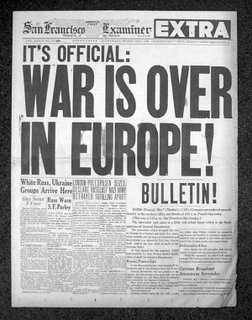Wednesday, December 06, 2006
Friday, December 01, 2006
Calvin for the Christian
“The Apostle assigns the reason, “Though he was a Son, yet learned he obedience by the things which he suffered,” (Heb. 5:8). Why then should we exempt ourselves from that condition to which Christ our Head behoved to submit; especially since he submitted on our account, that he might in his own person exhibit a model of patience?” (p.431). Why are the calls to follow Christ and to suffer seen as mutually exclusive? When considering the normative life of a Christian we speak of living morally, attending church, being good citizens, etc. and then (maybe) make some concession for the reality of hardship. I pray I will be able to cultivate an ecclesial community someday which recognizes and even embraces a cruciform understanding of life.
However, this costly lifestyle of cross-bearing results in something profound. We will be privileged to taste of our Savior in ways luxury could never afford! Calvin assures us, “How powerfully should it soften the bitterness of the cross, to think that the more we are afflicted with adversity, the surer we are made of our fellowship with Christ; by communion with whom our sufferings are not only blessed to us, but tend greatly to the furtherance of our salvation” (p.431-432).
Monday, September 18, 2006
Sunday, August 20, 2006
Liturgy as Newspaper

Hot off the press, something has happened and is being reported as fact, taking place in space and time. We read, we think, we converse--we respond. Come in off the sidewalk and pick it up. It is declarative of something fresh, something alive--the news of a dynamic God on the move. He is assembling a people, building a kingdom, renewing the cosmos. Just as we open our city's daily newspaper with the expecation of being informed and even challenged by the realities of our world, so might we open our liturgies with the expectation of being informed and indeed challenged by the realities of our God and His world. War is Over, Christ is Risen.
Sunday, August 06, 2006
Of Criminals and Their Transporation

Driving through South City the other day. Stopping at a red light I look next to me and see a St. Louis Metropolitan Police van. This was no ordinary van. Through the windows a steel cage was visible, seemingly custom fit to match the entire space of the back portion of the vehicle. Then it hit me--People ride in the back of that van, locked inside that cage, through busy traffic, right down the middle of countless city streets. These are human beings who have, to some degree, forfeited their humanity through their crimes, many of which dehumanize their victims. Though my understanding of our justice system is extremely limited, I think it says something profound when we put a fellow human being behind bars. In effect, we are stating, "You have violated an image-bearer, another creature representative of the Creator God. This is ultimately an offense against God. As a result, measures must be taken to see that you answer for your actions." However incarceration must never be the end of the story. Should we not consider everything from the cage, to the courtroom, to the prison cell as means to the end goal of reconciliation with and restoration to humanity, the very community in which they committed the crime? This side of the Fall I would like to think of every van with a cage I see as the first step in restoring a criminal to his own humanity and humanity at large.
